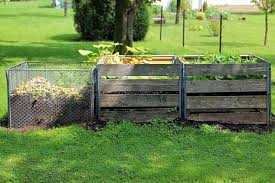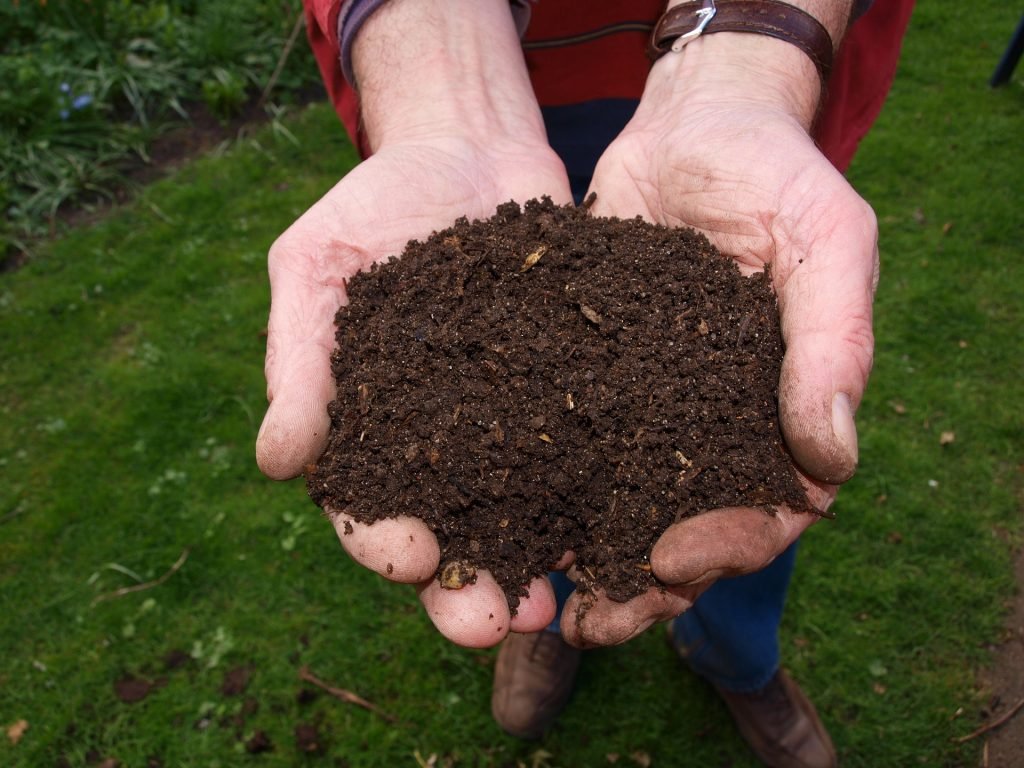 In every garage renovation, we consider the homeowners lifestyle to consider the types of garage storage solutions required including how people can optimize their recycling, composting and waste. With garden composting, there are a variety of methods and some of them will fit you and your family better than others.
In every garage renovation, we consider the homeowners lifestyle to consider the types of garage storage solutions required including how people can optimize their recycling, composting and waste. With garden composting, there are a variety of methods and some of them will fit you and your family better than others.
Some of the options for storing composting include the backyard or garden, outdoor bins, inside the garage and potentially, in the home. The choice depends on the space available, the type of composting and family lifestyle. To figure out the best option for your family, it’s important to understand composting options and methods.
Composting for More than Rich Soil
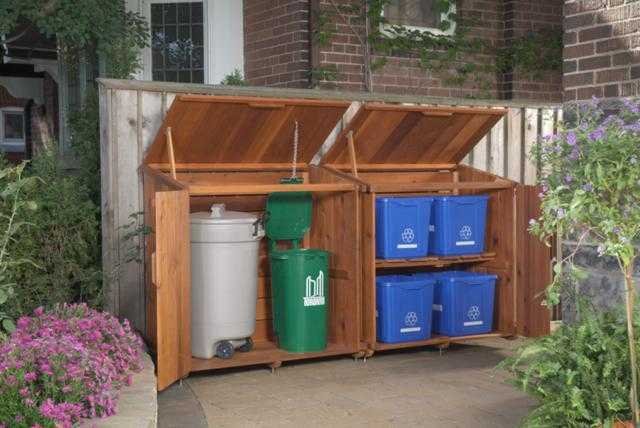 Of course, most of us already understand that we can compost 30% of our waste so we don’t add to the mounting landfills where even kitchen waste which is not properly processed can produce methane gases. Instead, when we mix kitchen scraps into compost, we produce something far more valuable without the methane gas production.
Of course, most of us already understand that we can compost 30% of our waste so we don’t add to the mounting landfills where even kitchen waste which is not properly processed can produce methane gases. Instead, when we mix kitchen scraps into compost, we produce something far more valuable without the methane gas production.
We enrich the soil in our own yards with compost and it becomes nutrient rich so our garden harvest may be abundant. Compost can replace or reduce fertilizer use in our gardens.
Composting can also bind heavy metals and render them harmless. Heavy metals are considered toxic when they are all by themselves. Some of these heavy metals include: mercury, copper, cadmium, chromium, lead, nickel, arsenic, zinc and tin. In small doses, these metals are fine but long term exposure to even small doses is not healthy. When the simple heavy metal atoms are composted, they start to bind to form complex molecules within the compost. When heavy metals fully combine into complex molecules, they become quite harmless. This is why composting is effective in reducing toxins, especially when we allow the compost process to continue to full completion.
Compost also prevents other pollutants from reaching our streams and waterways. For instance, nitrogen often found in fertilizers will run off but when compost is used, nitrogen will bind to the molecules found in compost and remain near the plants requiring nitrogen. Compost increases the effectiveness of fertilizer while minimizing nitrogen run off. Another pollutant is phosphorus which depletes our waters of oxygen while killing the vegetation and other life in these waters. It also binds to compost and prevents the run off that is so dangerous to our waterways.
To start the garden season successfully, prepare now so your compost is ready in a few months to a year depending on the type of composting method you choose.
Hot Composting vs. Cold Composting
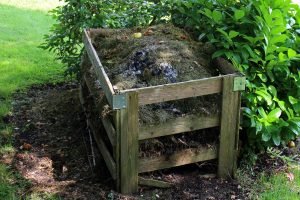 Just as these names suggest, hot composting will produce a lot of heat due to the high number of chemical reactions taking place in a short amount of time. Hot composting is complete in a few months but requires a higher amount of attention and care. The proportions of compostable waste used in a hot compost needs to be exact. Hot composts need 25 parts brown waste like leaves or untreated cardboard and 1 part green waste such as grass clippings or kitchen scraps. Then the compost needs to be turned every 2- 3 weeks to keep it cooking. The hot compost temperatures inside the pile are hot enough to cook upon or run water pipes through the centre of it to produce hot water.
Just as these names suggest, hot composting will produce a lot of heat due to the high number of chemical reactions taking place in a short amount of time. Hot composting is complete in a few months but requires a higher amount of attention and care. The proportions of compostable waste used in a hot compost needs to be exact. Hot composts need 25 parts brown waste like leaves or untreated cardboard and 1 part green waste such as grass clippings or kitchen scraps. Then the compost needs to be turned every 2- 3 weeks to keep it cooking. The hot compost temperatures inside the pile are hot enough to cook upon or run water pipes through the centre of it to produce hot water.
Cold composts, on the other hand, don’t need exacting proportions of brown and green wastes. The composting process is slower so the temperature rarely rises. The process also takes approximately a year as opposed to months. The lower temperatures means that pathogens don’t get killed off so you can’t add meats or other potentially dangerous waste. Some people do feel that the cold composting method leaves more helpful microorganisms. It’s best for one person when there is not a lot of waste generated by the household.
Vermicomposting
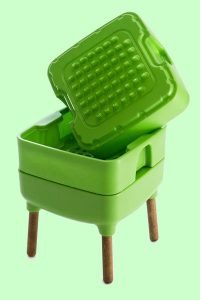
This is composting via worms. It’s fast, efficient and takes a lot less space than hot or cold composting. This form of composting also eliminates many plant diseases. This can even be done in condos or apartments where there is limited space. Plus, this is one of the easiest ways to compost in winter. These composters can be stored in the garage or kitchen so people who live in condos or apartments who want to have terrariums in their home can have their own rich earth for a fresh spice garden.
Green Bin City Composting
This way of composting is also a good way to help the environment. Your household doesn’t benefit from access to quality soil for the garden when the compost is finished. However, if gardening is not one of your past times, this method is easiest on time and effort so this may best suit your needs. There are a number of good solutions for storing the large green bins in the garage.
When is Compost Finished?
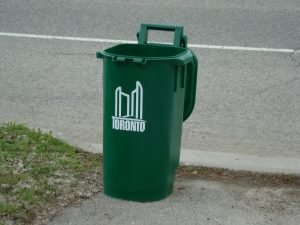 Only use finished compost in the garden. You’ll know it’s finished when it looks like dark rich earth and it should smell like earth. If there is any vegetable or kitchen scrap smell to it, the compost is still cooking. As we discussed earlier, immature compost will still contain toxic heavy metals, pathogens and acids which all can be harmful to the vegetation and plants it supports in the garden. Also, since the process of composting requires a lot of nitrogen and oxygen, these are unavailable to the plants when the compost is still cooking. Unfinished compost is not beneficial for the garden so waiting for finished compost is an important step of the compost process.
Only use finished compost in the garden. You’ll know it’s finished when it looks like dark rich earth and it should smell like earth. If there is any vegetable or kitchen scrap smell to it, the compost is still cooking. As we discussed earlier, immature compost will still contain toxic heavy metals, pathogens and acids which all can be harmful to the vegetation and plants it supports in the garden. Also, since the process of composting requires a lot of nitrogen and oxygen, these are unavailable to the plants when the compost is still cooking. Unfinished compost is not beneficial for the garden so waiting for finished compost is an important step of the compost process.
Types of Composting Systems
The various composting systems need to be situated in different locations around the house. For hot composting, open wooden bins are the best method and they are placed near the garden. They’re not as aesthetically pleasing but they are the most effective way for hot compost. For cold composting, it can be as simple as the pile method where a hole in the ground is made available for compostable waste. When the compost is finished, the soil in that area of the garden will be reading for the next planting.
Commercial compost bins or green bins can be stored in outdoor bin storage areas or in the garden over top of where the garden needs enrichment if the composting bin is bottomless. And, come composters can find a place within your garage. When you’re thinking of garage storage design for the avid gardener, a good garage storage system will help you accommodate your favourite compost system whether it’s the city’s green bin or other form of composting.
If you’re considering a new garage interior design in the near future, consult with one of our garage renovation specialists and remember your recycle, compost and waste as one of your overall space requirements around your garage and home.

